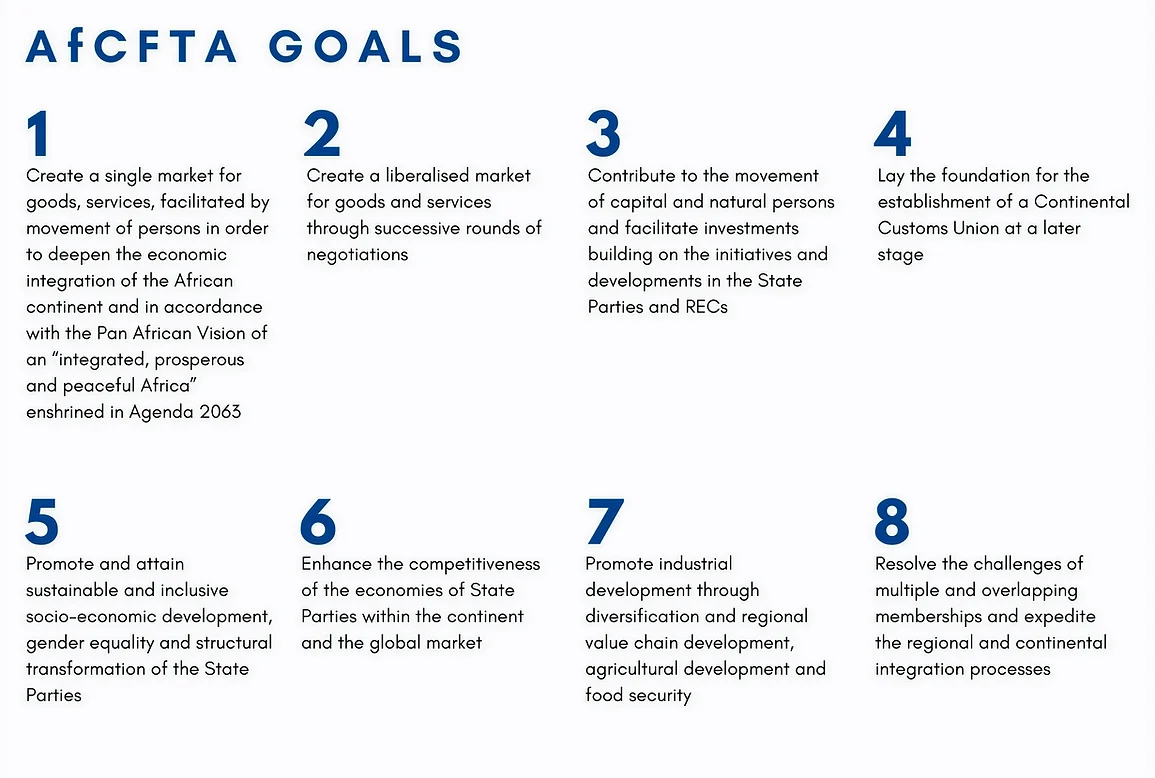
Exploring the New Market Opportunities and Policy Challenges for Africa’s Private Sector under AfCFTA
A Report of the ALP Private Sector
Engagement Townhails on AfCFTA
The agreement
What is the AfCFTA?
The African Continental Free Trade Area, once ratified by all signatories, will create a free trade area across the continent, with the aim of creating a single market for goods and services, as well as an area for the free movement of people and investment.
The agreement was signed in 2018 at the 10th extraordinary session of the African Union in Kigali and came into force on 30th May 2019, while trading under it began on 1st January 2021.
AfCFTA will govern the trade of goods and services, with the stated aim of reducing and removing tariffs, as well as creating a free movement of individuals to increase intra-African trade and boost the continental economy.
A cornerstone of the African Union’s Agenda 2063, AfCFTA is central to achieving the programme’s flagship projects of a single air transport market, free movement of people, and a single goods and services market.
It is important to note the AfCFTA does not create a European Commission-style supra-national organisation. Implementation is still the responsibility of individual states party to the AfCFTA. Ultimately it is the state’s delegations that negotiate everything from the reduction of tariffs and rules of origin, to trade facilitation.
Who is involved?
54 of the 55 African nations have signed the treaty, with 48 currently having ratified it. Eritrea is the only state to not sign up, though it is expected they will follow suit in the near future.
Initially, Nigeria and South Africa, Africa’s two largest economies, were notable holdouts, concerned the treaty may reduce domestic entrepreneurship. However, both have now signed and South Africa has ratified AfCFTA.
Countries who have ratified AfCFTA: Ghana, Kenya, Rwanda, Niger, Chad, Eswatini, Guinea, Côte d’Ivoire, Mali, Namibia, South Africa, Congo, Rep., Djibouti, Mauritania, Uganda, Senegal, Togo, Egypt, Ethiopia, Gambia, Sahrawi Arab Democratic Rep., Sierra Leone, Zimbabwe, Burkina Faso, São Tomé & Príncipe, Equatorial Guinea, Gabon, Mauritius, Central African Rep., Angola, Lesotho, Tunisia, Cameroon, Nigeria, Malawi, Zambia, Algeria, Burundi, Tanzania, Seychelles, Somalia, Guinea-Bissau and Liberia.

What are the key components?
The AfCFTA is attempting to boost trade by improving capacity and reducing trade friction. It is hoped stronger cooperative frameworks will create ideal trading conditions, increasing intra-African trade – boosting revenues and livelihoods. The relationships being built between public and private enterprise both internally and across borders will strengthen trading and improve competitiveness.
In practice, this means:
The creation of a single market
The free movement of people and capital
The reduction of tariffs on 90% of goods over an initial 5 and then 10 year period
Structure
The AfCFTA has established a number of institutions to govern the free trade area. Ultimate oversight is provided by the
African Union Assembly, comprising all heads of state across the continent.
The Council of Ministers is comprised of trade ministers of other nominated persons by signatories. The Council reports to The Assembly through the Executive Council of the AU but has authority to make decisions under the AfCFTA.
The Committee of Senior Trade Officials is made up of Permanent Secretaries designated by treaty signatories and is responsible for the development of programmes focused on the implementation of the AfCFTA agreement.
The AfCFTA Secretariat is an administrative organisation coordinating the implementation of the AfCFTA.
The Disputes Settlement Mechanism is set to mirror that of the WTO disputes system.
What’s been agreed and what’s still to be agreed?
The different protocols in the agreement are negotiated over two phases. Phase one concerns trade in goods, trade in services and dispute settlements. This phase has seen negotiations on issues such as tariffs, rules of origin and schedules for specific services.
Negotiations have focused on 5 key areas –
Telecommunications
Transport
Tourism
Finance
Business services
Phase two of negotiations has focused on protocols on competition, intellectual property rights and investment.
